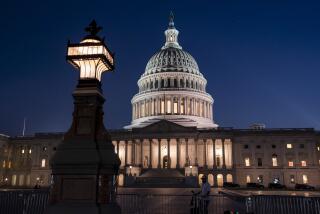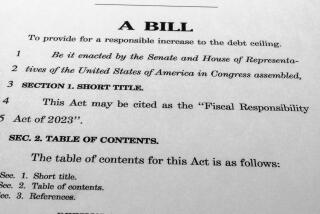Senate Approves Tightening of Bankruptcy Code
- Share via
WASHINGTON — The Senate on Wednesday overwhelmingly approved a major overhaul of the nation’s bankruptcy code that would make it harder for people who make more than $50,000 a year to wipe out their debts in Bankruptcy Court.
The bill, backed by the Clinton administration, was adopted by a bipartisan vote of 97 to 1, reflecting Congress’ desire to slow the record tide of bankruptcy filings.
But the chances of reaching that goal are uncertain. In June, the House approved a more restrictive measure strongly opposed by the Clinton administration. And it is not clear that a compromise can be struck in the waning days of the Congress, now scheduled to adjourn early next month.
The Senate bill was the first major piece of legislation approved by either chamber since Congress returned from its summer recess and received independent counsel Kenneth W. Starr’s report on the Monica S. Lewinsky case.
The legislation aims to “punish those who would exploit the bankruptcy system as a tool of financial planning,” said Sen. Charles E. Grassley (R-Iowa), the measure’s key author.
The bill would give bankruptcy judges the authority to determine if people who earn more than $50,000 annually but want to file for bankruptcy protection could afford to repay 30% of their debt within five years. The judge could then direct them to file under Chapter 13, which calls for a repayment plan, rather than Chapter 7, which wipes out all unsecured debts. Currently, an individual can choose Chapter 7 virtually without restriction.
The House bill, by contrast, mandates that people be forced to file under Chapter 13 if they have incomes of more than $50,000 and sufficient resources to repay 20% of their debts in five years. The House bill makes Chapter 13 automatic unless there is an extenuating circumstance, such as a sick child and large medical bills.
Administration officials have called the House bill “rigid and arbitrary” and warned that it would draw a veto.
Both versions would have an impact on a relatively small part of the bankrupt population. Last year, a record 1.4 million individuals filed for bankruptcy. But only 10% to 15% of this group had annual incomes above $50,000.
The vast majority would still be free to file for Chapter 7, which eliminates all debts except mortgages, car payments and taxes.
Business welcomed Wednesday’s Senate action while consumer groups expressed concern.
The bill “protects small business and retailers from the burden imposed by abuse of the current bankruptcy system,” said Thomas J. Donohue, president and chief executive of the U.S. Chamber of Commerce.
Senate passage “is a huge step forward in the effort to restore fairness, personal responsibility and common sense to our flawed bankruptcy laws,” said the National Consumer Bankruptcy Coalition, whose members include banks, credit card firms and retailers.
The coalition expressed confidence that a compromise reconciling the House and Senate bills can be achieved.
Consumer groups were pleased with some amendments added by the Senate but worried that these could be dropped in negotiations to produce a compromise.
If the final bill does not “lock in” protections for consumers, “President Clinton should get his veto pen ready,” read a group statement by the Consumer Federation of America, Consumers Union and the National Consumer Law Center.
Several senators argued that credit card companies should be held responsible for the explosion of debt stemming from their mass solicitation of new customers.
The companies also were criticized for financial retaliation against customers who pay their bills in full each month. The Senate adopted an amendment barring credit card companies from imposing penalties--such as extra charges or even cancellation of credit cards--on those who do not carry balances on their accounts.
Another amendment calls on the Federal Reserve Board to study the credit card industry for two years to examine the “indiscriminate solicitation and extension of credit.” The Fed would have the power to adopt new rules to “ensure responsible industry-wide practices,” according to the amendment by Sen. Dianne Feinstein (D-Calif.).
Sen. Paul Wellstone (D-Minn.), one of the Senate’s most liberal members, cast the sole vote against the bill.
More to Read
Get the L.A. Times Politics newsletter
Deeply reported insights into legislation, politics and policy from Sacramento, Washington and beyond. In your inbox twice per week.
You may occasionally receive promotional content from the Los Angeles Times.










